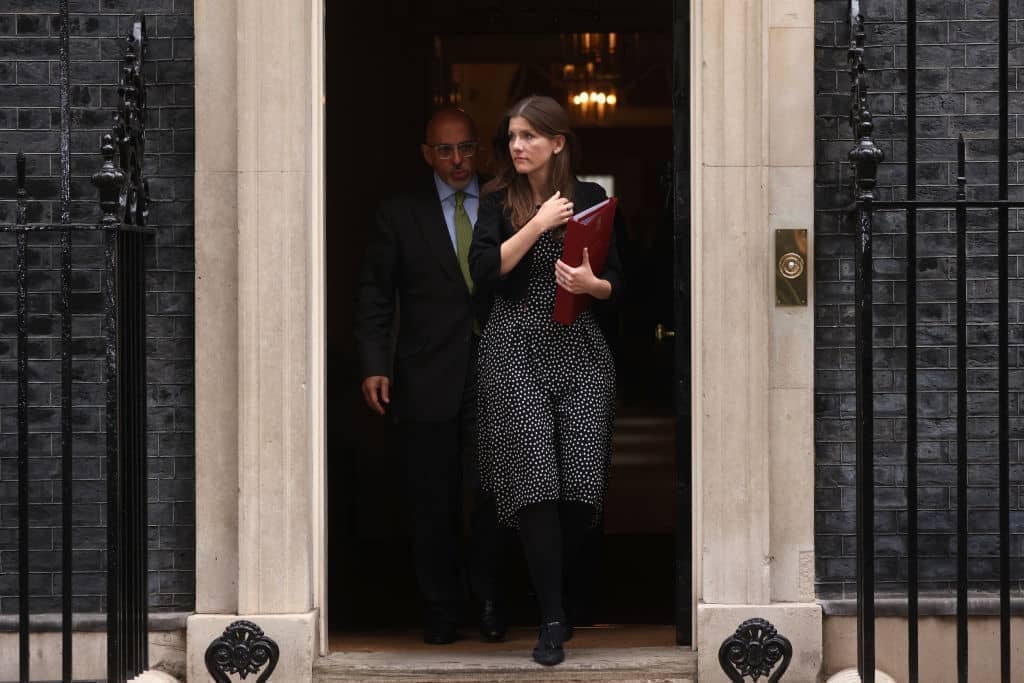Full marks to Michelle Donelan, the minister for universities, who has announced that the government is severing all ties with the National Union of Students (NUS).
In recent years, the NUS has become a disgrace, infested with levels of anti-Israel obsessiveness that would make your eyes water.
One story that stands out in my mind involved a scheduled performance by the Corbynite rapper Lowkey at the NUS conference in Liverpool in March. As a window into the performer and hard-left activist’s worldview, consider the lyrics of his song ‘Long Live Palestine’: ‘You say you know about the Zionist lobby. But you put money in their pocket when you’re buying their coffee. Talking about revolution, sitting in Starbucks.’ That’s the sort of chap we’re talking about.
Unsurprisingly, he has been a guest on Iran’s state-owned news network Press TV, on a programme hosted by the disgraced former MP Chris Williamson. Lowkey is a key figure in the radical Palestine Action group, which stages protests at properties used by Israeli-linked defence firms. More recently, he suggested that the media had ‘weaponised the Jewish heritage’ of Ukrainian leader Volodymyr Zelensky in order to deflect attention from Ukraine’s ‘far-right’ fighters.
Now the government has lost patience and decided to act
Understandably, Jewish students expressed their concern at the upcoming appearance of this firebrand provocateur at the NUS conference in March. Now here’s the kicker: as a solution, NUS officials suggested that worried Jews be directed into a ‘safe space’ while the gig was going on. Segregating Jews – now where have we come across that before? (The gig was later cancelled.)
Then there’s the new NUS president, Shaima Dallali. In 2020, she announced that she was marking Ramadan by raising money for Cage, a Muslim advocacy group whose research director called Isis killer Jihadi John a ‘beautiful young man’ who was ‘extremely kind and gentle’ in 2015. Dallali attacked anti-Hamas Jordanian preacher Dr Waseem Yousef as a ‘dirty Zionist’. And in 2018, she praised Muslim Brotherhood cleric Yusuf Al-Qaradawi – who called on God to kill Jews ‘down to the very last one’ and was expelled from Britain – calling him the ‘moral compass for the Muslim community at large.’
All this is in addition to her 2012 tweet reading, ‘Khaybar Khaybar O Jews… Muhammad’s army will return #Gaza’, referring to a notorious massacre of Jews in 628AD. (She later apologised for this post, which she made when she was a teenager.)
Ms Dallali was elected in March. She was hardly a one-off. One of her principal opponents, for instance, listed support for boycotting Israel as a main campaign pledge. Boycotting only democratic Israel, needless to say, not Russia, China, Iran or North Korea. And so it goes on.
You remember the scenes of outrage and carnage that were seen both in universities and on the streets last May, when 256 Palestinians, up to half estimated to be combatants, were killed in the conflict between Israel and Hamas. Thousands of people thronged on the streets. Police officers were assaulted. Rallies were held at multiple universities. The current Ukraine conflict, by contrast, has left tens of thousands dead, with massacres of civilians, systematic torture and deportation to camps. Whereas Israel does all it can to minimise civilian casualties, Putin’s war machine intentionally targets them. Where are the angry demonstrations? The scale of morality is totally off.
Now, students can be forgiven for their radicalism. After all, if you can’t be a radical while at university, when can you be? But in recent years, the emergence of ‘anti-Zionism’ as an indisputable part of hard-left ideology has caused anti-Semitism to seep into the fabric of student life on campus. In 2021, Israel’s ambassador to Britain, Tzipi Hotovely, had to be protected by security as she hurried from a speaking engagement at the London School of Economics through the ranks of a baying mob, which was trying to break through police lines. This year, Mrs Hotovely was targeted again at Cambridge University by activists who branded her ‘Zionist scum’, chanted Hamas slogans and set off flares. Whatever your views on Israel’s rights and wrongs, no other ambassador is treated in this way.
Jewish school-leavers now count campus attitudes as one of their main concerns when choosing a university. The ugly debacle involving Professor David Miller – the Bristol sociologist who was eventually sacked after telling the Jewish Chronicle that Bristol’s Jewish society students were ‘political pawns’ of a ‘violent, racist regime engaged in ethnic cleansing’ – was a case in point.
Why would any Jewish student wish to go to Bristol with this sort of thing going on? When they are forced to suffer through the poisonous, NUS-backed ‘Israel apartheid week’, when faux checkpoints are set up outside libraries? When essays are failed because they do not ascribe enough blame to Israel when criticising Hamas’s oppression of Palestinians?
Concerns have been escalating for some time. The chair of the Commons education committee, Robert Halfon, has called for the NUS to be investigated by the Charity Commission. And in April, 20 former NUS presidents, including three former cabinet ministers, sent a letter warning the organisation’s trustees to clean up the festering sore of anti-Semitism in the organisation. Signatories included former cabinet ministers Jack Straw, Charles Clarke and Jim Murphy, as well as Wes Streeting, Labour peer Maeve Sherlock, Trevor Phillips, JC columnist David Aaronovitch and Shakira Martin, the first black woman to lead the NUS.
Now the government has lost patience and decided to act. This is a vital intervention. If nothing is done to clamp down on the prejudice that sullies campus culture, generations of students will take it with them as they go on into adult life. In standing up to this, the government is standing up against anti-liberal forces that threaten all of us, both now and in the future. Boris’s administration may have got a lot of things wrong, but this is one thing it is getting right. On behalf of British Jewry: thank you.







Comments